A Guide to Understanding and Using Idiomatic Expressions
Idiomatic expressions are expressions (groups of words) that are not meant to be taken literally. Often, they don't make sense if you try to translate them word for word.
Lesson Table of Contents
- What Are Idiomatic Expressions?
- Idiomatic Expressions (Idioms) for Giving Advice
- Idiomatic Expressions (Idioms) to Give Compliments
- Idiomatic Expressions (Idioms) to Comfort Someone
- Caution: Idiomatic Expressions Overuse
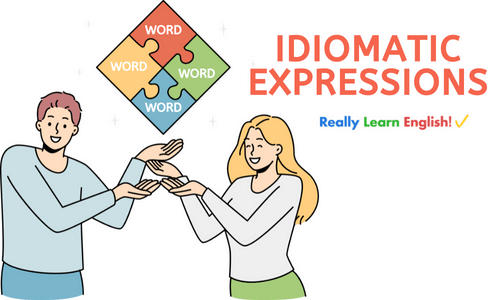
What Are Idiomatic Expressions?
An idiomatic expression (also called an idiom) is a group of words that has a meaning that cannot be understood from the meanings of the individual words. It is an expression that is used in a particular way by a particular group of people.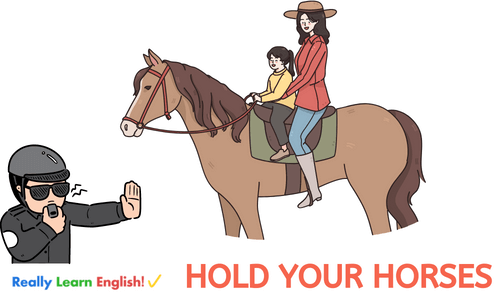
The phrase "hold your horses" is used to tell someone to calm down or wait a moment. This idiomatic expression helps listeners to visualize someone suddenly stopping their horses when they are about to ride away. It is an imaginative and interesting way to tell someone to wait before they do something.
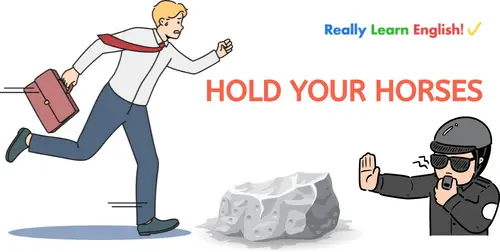
Idiomatic expressions are often used in everyday conversation, and they are a great way to add interest to your speech or writing.
If you are taking an advanced English class, idiomatic expressions are likely to come up in conversation or on tests. It is important to understand what they mean so that you can use them correctly.
Let's go over different idiomatic expressions and how to use them.
Idiomatic
Expressions (Idioms)
for Giving Advice
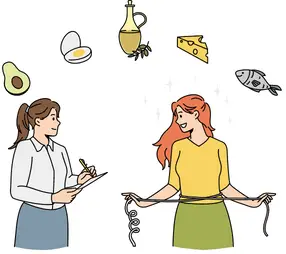
To "leap" means to make a sudden or large jump.
Imagine if you were going to jump into a pool. You would want to make sure there was water in it first, right? Otherwise, you would just hurt yourself. It's the same with anything else in life. You want to make sure you know what you're doing before you do it, or else you might end up getting hurt.
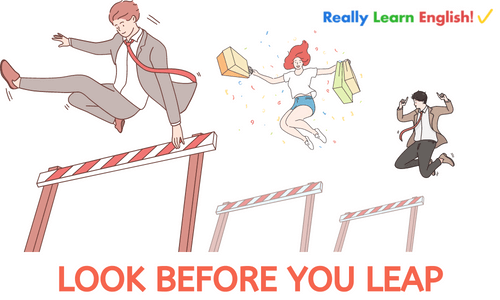
Example in context:
Joe: "That's a great idea! But you should look before you leap. Make sure you have a solid business plan before you quit your job."
"Don't put all your eggs in one basket": don't put all your resources into one thing.
When you have a lot of something, it's important to not keep it all in one place. If you have ten eggs, for example, you wouldn't want to put them all in one basket. If you dropped the basket, you would lose all your eggs. It's better to put two eggs in five different baskets. That way, if you drop one basket, you only lose two eggs instead of all ten.
Example in context:
Joe: "That's a risky move. You shouldn't put all your eggs in one basket. You should invest in different things so that you don't lose everything if the business doesn't work out."
"Don't count your chickens before they hatch": don't make plans for something before it is actually confirmed.
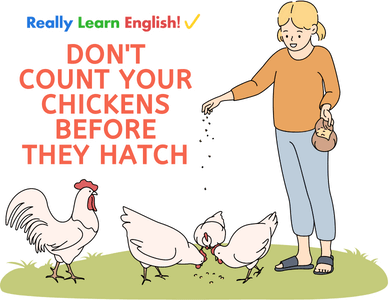
Imagine you buy a lottery ticket. You might start daydreaming about what you would do with the money if you won. But until you actually see the winning numbers on the ticket, it's best not to buy that new car or house just yet.
Example in context:
Andy: "I'm so excited! My boss said I might get a raise next month. I'm going to start looking for a new apartment."
Joe: "That's great, but don't count your chickens before they hatch. Wait until you actually get the raise before you start making plans."
Idiomatic Expressions (Idioms)
to Give Compliments

People like to feel appreciated. Here are some idiomatic expressions that can be used to give compliments:
"Cute as a button": very cute. It is often used to describe children, but can be used for adults, animals, and objects as well.
Imagine a tiny kitten. It is sleeping peacefully and looks like a little ball of fur. It is so cute and pleasant to look at that it could be described as "cute as a button."
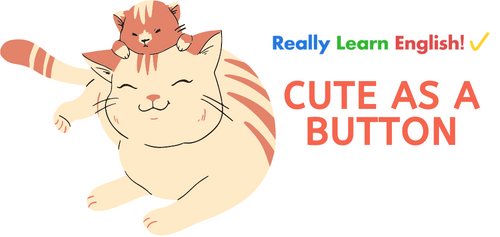
Example in context:
Andy: "Aww, look at that baby! She is cute as a button."
Joe: "Thank you. We think so too. Her name is Amy."
"On the ball": This expression means that someone is very alert and aware of what is happening around them. They are quick to understand and react to things, and they understand the situation well.
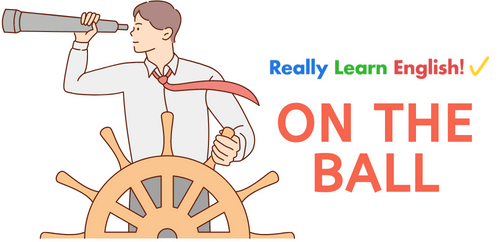
For example, if you are in a meeting and the boss asks a question, it is good to be "on the ball" and have an answer ready.
"On the ball" originally comes from "Keep your eyes on the ball" (in sports). Players need to be very aware of the ball at all times so that they can hit it or catch it. Imagine a soccer player. They need to be constantly watching the ball so that they know where it is and what is happening with it.
Example in context:
Andy: "I can't believe John was able to solve that problem so quickly. He's really on the ball."
Joe: "Yes, he is. He is one of our best employees."
"Out of this world": extremely good and impressive.
When something is "out of this world," it is so good that it is almost impossible to believe. It is like it comes from another world entirely.

"World" means planet Earth with everything on it. So literally speaking, "out of this world" means not from Earth.
Example in context:
Andy: "I just tried this new restaurant and the food was out of this world! I've never had such good sushi before."
Joe: "I'm glad you liked it. I'm going to try it next week."
Idiomatic Expressions (Idioms)
to Comfort Someone
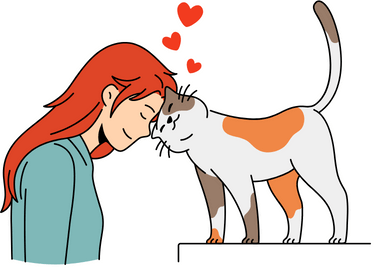
To comfort means to make someone feel better. Here are some idiomatic expressions that can be used to comfort someone when they feeling down:
"Bright side": the good part of a situation.
Even when things are tough, there is always a "bright side." This expression means that even though something bad has happened, there is still something good about the situation. For example, if you fail a test, the bright side is that you now know what you need to study for the next one.
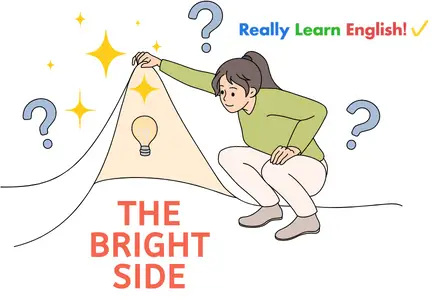
Example in context:
Andy: "I'm so upset! I didn't get the job I wanted."
Joe: "Cheer up. The bright side is that now you can focus on finding a job that you will like even more."
"Light at the end of the tunnel": This idiomatic expression means that even though things are tough now, they will eventually get better. In other words, we can see signs of improvement or signs that something difficult is about to end.
For example, when someone is studying for weeks for a difficult exam, but in two days it will all be over, you could say "There is a light at the end of the tunnel. You will be done with the exam soon."
Another example is when someone is going through a lot of financial trouble in his business. He is working hard and trying to get his business back on track. Even though things are tough now, he can see signs that his business is improving. He can see the "light at the end of the tunnel."
The "light at the end of the tunnel" is a symbol of hope. It represents the idea that things will eventually get better and there is a way out of the tough situation. Imagine you are in a long, dark tunnel. You can't see the end and you don't know how much longer you have to walk. But then you see a light in the distance. This light represents the hope that you will eventually get out of the tunnel.

Example in context:
Andy: "I've been working on this project for weeks and I'm so stressed out. I can't wait for it to be over."
Joe: "Hang in there. There is a light at the end of the tunnel. You will be done soon and you will have a great project to show for it."
("Back on track" means to return to a normal or successful state. "Hang in there" means to continue to try even though it is difficult. "Have something to show for it" means to achieve something that you can be proud of or that is worth the effort.)
"Keep your chin up": This idiomatic expression means to stay happy and optimistic during difficult times.
For example, if your best friend has just broken up with her boyfriend and feels like her life is falling apart, you could say "Don't worry, things will get better. Just keep your chin up and stay positive. You will find someone who is even better for you."
Another example is if someone is having a lot of trouble at work and they feel like they are about to be fired, you could say "I know you're going through a tough time at work, but don't give up. Just keep your chin up and do your job to the best of your ability. I'm sure you will be able to turn things around." ("Turn things around" means to improve a situation that is not going well.)
The "chin" is the part of the face below the mouth. "Keeping your chin up" means staying strong and not letting the difficult situation get you down (make you unhappy).
The phrase comes from the idea that when our chin is down, we look sad. But when our chin is up, we look confident and ready to conquer the world.

Example in context:
Andy: "I'm so down. I failed my test and now I have to take it again."
Joe: "Don't worry about it. These things happen. Just keep your chin up and review the parts you did not fully understand. You will do better next time."
Caution: Idiomatic Expressions Overuse
When used occasionally, idioms add color and life to your writing or conversation. However, if you use idioms too often, it can actually become pretty annoying for your readers or listeners!Here is an example of a dialogue with a natural use of idioms:
Andy: "Hi Joe! How are you?"Joe: "I'm good. Just taking it one day at a time."
Andy: "Yeah, that's the best way to do it. Hey, did you hear about the new restaurant that opened up downtown?"
Joe: "No, I haven't. Is it any good?"
Andy: "I haven't tried it yet, but I hear the food is really good. You should check it out!"
Joe: "I might just do that. Thanks for the heads up!"
In this dialogue, the idioms are used sparingly and appropriately. They sound natural and add to the conversation.

Now, let's take a look at the same exact dialogue, but this time with too many idioms:
Andy: "Hello stranger! Long time no see! Whats good in the hood?"
Joe: "I'm all in one piece. Just taking it one day at a time."
Andy: "Yeah, that takes the cake. Hey, did you get wind of the new restaurant that is getting in the groove downtown?"
Joe: "No, I was in the dark. Is it nice as pie?"
Andy: "I haven't laid my eyes on it yet, but I'm told by the grapevine that it's the cat's meow. You should take stock of it!"
Joe: "Yeah, I think I'll sleep on it. Thanks for the heads up!"
In this version of the dialogue, the idioms are used too frequently and it sounds unnatural. People simply don't talk like that. The idioms actually interrupt the flow of the conversation and make it difficult to understand.
So, when using idioms, be sure to use them sparingly! A little goes a long way :-)
A list of idioms used in the dialogues and their meanings (in order of appearance):
just taking it one day at a time: not worrying about the future or thinking about the past, but just focusing on today. For example, if you are worried about a test tomorrow, instead of thinking about how you might fail, you focus on studying today and doing your best.heads up: a warning or piece of information that is given.
hello stranger!: a friendly way of saying "long time no see". ("long time no see" means that you haven't seen the person in a long time).
what's good in the hood?: a way of asking how someone is doing. ("the hood" is another word for "neighborhood").
all in one piece: I'm fine, I haven't been hurt.
takes the cake: that's the best, or that's the worst. For example, if you have had a really bad day, you might say "This day takes the cake!". Another (good) example: Let's say you spot the most beautiful car you have ever seen. You could say "This car takes the cake!".
get wind of: to hear about something or find out about it, usually through gossip or rumors. Imagine the wind is blowing and carrying information to you.
getting in the groove: becoming popular or busy.
in the dark: not knowing about something.
nice as pie: very good or pleasant. Imagine a delicious pie!
laid my eyes on: to see something.
by the grapevine: through rumors or gossip, not from an official source. ("Grapevine" means a climbing plant on which grapes grow.) For example, if you hear that your friend got a new job, but you haven't heard it from her directly, you might say "I heard it through the grapevine".
the cat's meow: very good or fashionable.
take stock of: to carefully examine or check something out. For example, if you want to buy a new car, you might "take stock" of all the different types of cars before you decide which one to buy. ("Stock" means a supply of something you use or sell.)
sleep on it: to wait before making a decision, usually because you want to think about it more.
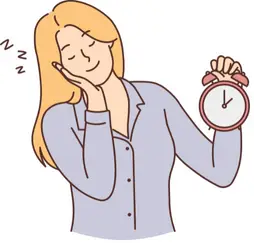
Idiomatic Expressions
Quiz
1. What is the meaning of "I'm all in one piece"?A) I'm very tired.
B) I'm fine, I haven't been hurt.
C) I only have one piece of advice.
2. What is the meaning of "that takes the cake"?
A) that's the best
B) that's the worst
C) that's the best or that's the worst (depending on the context)
3. What is the meaning of "get wind of something"?
A) to hear about something or find out about it, usually through gossip or rumors
B) to feel a sudden wind that cools the area
C) to make something go so fast that it lifts off the ground
4. What is the meaning of "laid my eyes on something"?
A) to see something
B) to have an idea
C) to give your eyes some rest
5. What is the meaning of "hold your horses"?
A) to take advantage of every opportunity
B) to calm down or wait a moment
C) to stop your enemies before they succeed
6. What is the meaning of "look before you leap"?
A) to take risks
B) to find the best people to support you
C) to check something out before you do it
7. What is the meaning of "in the dark about something"?
A) not knowing about something
B) being too lazy to do something
C) being in a place with no lights
8. What is the meaning of "back on track"?
A) improving and getting back to normal
B) going in the wrong direction
C) being lazy and not doing anything
9. What is the meaning of "cute as a button"
A) very small
B) very cute
C) very fashionable
10. What is the meaning of "hang in there"?
A) to stay positive and not give up
B) to do something quickly
C) to wait for someone or something
11. What is the meaning of "long time no see"?
A) I tried to reach you but I couldn't.
B) You look good!
C) I haven't seen you in a while
12. What is the meaning of "on the ball"?
A) very alert and aware of what is happening around them
B) doing something illegal
C) doing something quickly
13. What is the meaning of "turn things around"?
A) to improve a situation that is not going well
B) to come up with a creative idea
C) to change your plans
14. What is the meaning of "heads up"?
A) A head moving to show that someone is paying attention
B) A warning or piece of information that is given
C) to hit someone with a ball
15. What is the meaning of "keep your chin up"?
A) to stay strong and not give up
B) to look your opponent in the eyes
C) to never forget where you come from
16. What is the meaning of "bright side"?
A) the part of a room with the best lightening
B) the hottest days of the summer
C) the positive side of things
17. What is the meaning of "sleep on it"?
A) to take a long nap, usually because your worked too hard
B) to wait before making a decision, usually because you want to think about it more
C) to miss a good opportunity, usually because you were not paying attention
18. What is the meaning of "out of this world"?
A) very good and impressive.
B) extremely terrible
C) not part of this culture or not morally accepted
19. What is the meaning of "light at the end of the tunnel"?
A) the last part of a good journey
B) a difficult situation that will eventually end or improve
C) a sign that things are getting better
20. What is the meaning of "getting in the groove"?
A) enjoying yourself so much that you forget where you are
B) dancing and having the best time of your life
C) becoming popular or busy
Resources on English Idioms:
- English Idioms Exercises and Videos
- Teaching Idioms: How to Teach Idioms in 4 Steps
- A Guide to Understanding and Using Idiomatic Expressions
- Idioms of "Happy": The Top 10 You Should Know
- 10 Useful Business Idioms in English
Quiz Answers
1.B | 2. C | 3. A | 4. A | 5. B | 6. C | 7. A | 8. B | 9. B | 10. A | 11. C | 12. A | 13. A | 14. B | 15. A | 16. C | 17. B | 18. A | 19. B | 20. C
Get Updates, Special Offers, and English Resources
Download your FREE GIFT (the first two chapters of
English Short Stories Book and Workbook)
as soon as you join!

By submitting your email, you consent to receiving updates and newsletters from us and to the sharing of your personal data with third parties for the purposes of sending you communications. We will not spam you. You can unsubscribe at any time. For more information, please see our privacy policy.
Return
from
A Guide to Understanding and Using Idiomatic Expressions to
English Idioms





